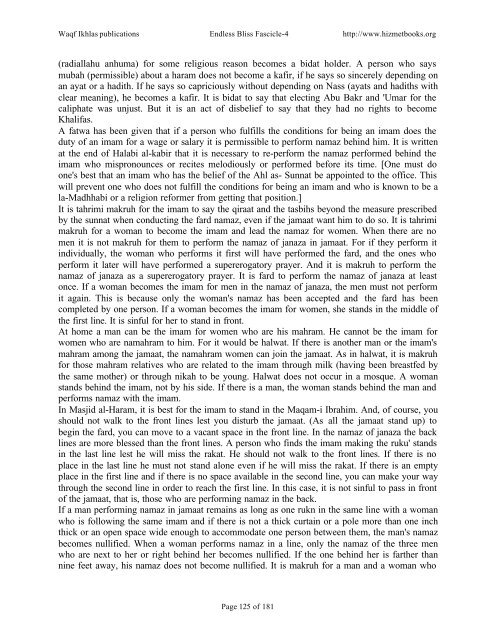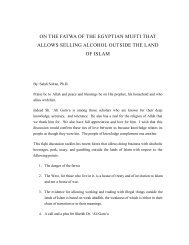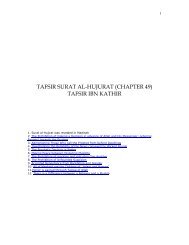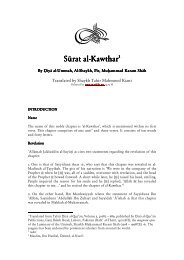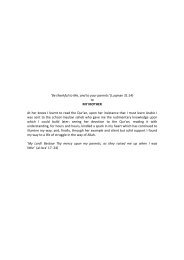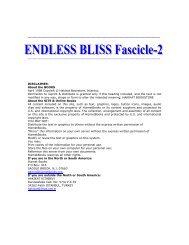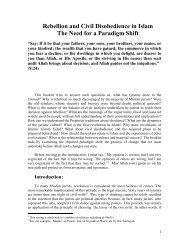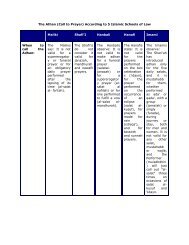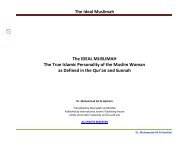ENDLESS BLISS FASCICLE-4
ENDLESS BLISS FASCICLE-4
ENDLESS BLISS FASCICLE-4
Create successful ePaper yourself
Turn your PDF publications into a flip-book with our unique Google optimized e-Paper software.
Waqf Ikhlas publications Endless Bliss Fascicle-4 http://www.hizmetbooks.org<br />
(radiallahu anhuma) for some religious reason becomes a bidat holder. A person who says<br />
mubah (permissible) about a haram does not become a kafir, if he says so sincerely depending on<br />
an ayat or a hadith. If he says so capriciously without depending on Nass (ayats and hadiths with<br />
clear meaning), he becomes a kafir. It is bidat to say that electing Abu Bakr and 'Umar for the<br />
caliphate was unjust. But it is an act of disbelief to say that they had no rights to become<br />
Khalifas.<br />
A fatwa has been given that if a person who fulfills the conditions for being an imam does the<br />
duty of an imam for a wage or salary it is permissible to perform namaz behind him. It is written<br />
at the end of Halabi al-kabir that it is necessary to re-perform the namaz performed behind the<br />
imam who mispronounces or recites melodiously or performed before its time. [One must do<br />
one's best that an imam who has the belief of the Ahl as- Sunnat be appointed to the office. This<br />
will prevent one who does not fulfill the conditions for being an imam and who is known to be a<br />
la-Madhhabi or a religion reformer from getting that position.]<br />
It is tahrimi makruh for the imam to say the qiraat and the tasbihs beyond the measure prescribed<br />
by the sunnat when conducting the fard namaz, even if the jamaat want him to do so. It is tahrimi<br />
makruh for a woman to become the imam and lead the namaz for women. When there are no<br />
men it is not makruh for them to perform the namaz of janaza in jamaat. For if they perform it<br />
individually, the woman who performs it first will have performed the fard, and the ones who<br />
perform it later will have performed a supererogatory prayer. And it is makruh to perform the<br />
namaz of janaza as a supererogatory prayer. It is fard to perform the namaz of janaza at least<br />
once. If a woman becomes the imam for men in the namaz of janaza, the men must not perform<br />
it again. This is because only the woman's namaz has been accepted and the fard has been<br />
completed by one person. If a woman becomes the imam for women, she stands in the middle of<br />
the first line. It is sinful for her to stand in front.<br />
At home a man can be the imam for women who are his mahram. He cannot be the imam for<br />
women who are namahram to him. For it would be halwat. If there is another man or the imam's<br />
mahram among the jamaat, the namahram women can join the jamaat. As in halwat, it is makruh<br />
for those mahram relatives who are related to the imam through milk (having been breastfed by<br />
the same mother) or through nikah to be young. Halwat does not occur in a mosque. A woman<br />
stands behind the imam, not by his side. If there is a man, the woman stands behind the man and<br />
performs namaz with the imam.<br />
In Masjid al-Haram, it is best for the imam to stand in the Maqam-i Ibrahim. And, of course, you<br />
should not walk to the front lines lest you disturb the jamaat. (As all the jamaat stand up) to<br />
begin the fard, you can move to a vacant space in the front line. In the namaz of janaza the back<br />
lines are more blessed than the front lines. A person who finds the imam making the ruku' stands<br />
in the last line lest he will miss the rakat. He should not walk to the front lines. If there is no<br />
place in the last line he must not stand alone even if he will miss the rakat. If there is an empty<br />
place in the first line and if there is no space available in the second line, you can make your way<br />
through the second line in order to reach the first line. In this case, it is not sinful to pass in front<br />
of the jamaat, that is, those who are performing namaz in the back.<br />
If a man performing namaz in jamaat remains as long as one rukn in the same line with a woman<br />
who is following the same imam and if there is not a thick curtain or a pole more than one inch<br />
thick or an open space wide enough to accommodate one person between them, the man's namaz<br />
becomes nullified. When a woman performs namaz in a line, only the namaz of the three men<br />
who are next to her or right behind her becomes nullified. If the one behind her is farther than<br />
nine feet away, his namaz does not become nullified. It is makruh for a man and a woman who<br />
Page 125 of 181


